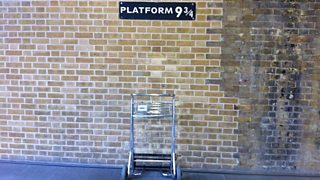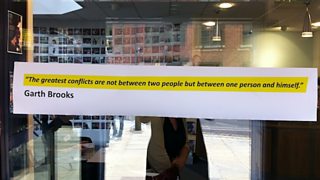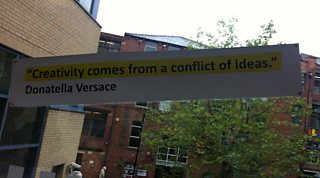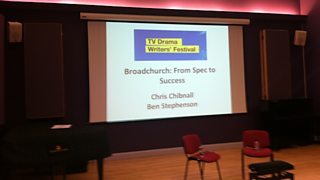Inside the ΒιΆΉΤΌΕΔ Writersroom TV Drama Writers Festival
Hannah Khalil
Digital Content Producer, About The ΒιΆΉΤΌΕΔ Blog
Tagged with:

Billed as: βTwo days of inspiring sessions, masterclasses and debate for professional writersβ, itβs an all-star affair, with a keynote from Doctor Who writer Steven Moffat and a whole host of important TV people including: ΒιΆΉΤΌΕΔ Controller of Drama, Ben Stephenson, director Phillipa Lowthorpe; producer and writer Pete Bowker; Emma Frost (writer The White Queen); Chris Chibnall (writer Broadchurch); writer Dennis Kelly and director Marc Munden (Utopia); Sally Wainwright (Last Tango in Halifax), Bryan Elsley and Jack Thorne (Skins), Tom Bidwell (My Mad Fat Diary), plus the ΒιΆΉΤΌΕΔβs own Development Producer Paul Ashton and the ΒιΆΉΤΌΕΔβs Creative Director of New Writing and Head of Writersroom, Kate Rowland.
I'm a little nervous. The festival started yesterday so Iβve missed out on Moffatβs keynote and the early minglingβ¦Μύ Will it be like starting school mid-way through the term? Will anyone talk to me? Or pick me for their team? I bite my lip in the hope of seeing a few friendly faces.

The theme of this yearβs festival is βconflictβ and as I walk in to the College of Music, where the event is being held, thereβs the first of a series of related quotes stuck to the wall.Μύ These quotes are a perfect metaphor for what the whole thingβs about β inspiring writers. Boy, do they succeed in their aim, in spades.Μύ I can tell from the moment I walk in where thereβs loud chat from many enthusiastic and, to my relief, friendly folk.

In my first session, Jack Thorne interviews Bryan Elsley about how the Channel 4 programme Skins came about. Bryan explains the idea was his son Jamieβs, and that it was Jamieβs unflinching attitude and vision (he was a teenager himself at the time) that lead to the rigourous and groundbreaking drama.
Next Emma Frost and Cameron Roache reveal the secret to planning a career as a television writer: you canβt really plan it! There are as many different kinds of paths as writers, but the rule of thumb is: write what you love and make great relationships with everyone around you β you never know, they may be the executive producers of tomorrow.

Chris Chibnall then talks to Ben Stephenson about his journey to creating Broadchurch, a labour of love that he was involved in every facet of. The conclusion of his story; that the key to great television drama is clarity of proposition and creative integrity. Chris says he knew exactly what he wanted to write from the outset β a piece that was very much character led, and then made sure that he achieved it in every minute of the show (thatβs where the integrity bit came in).
My final session starts with the panel β Dennis Kelly, Emma Frost, Toby Whithouse and Kate Rowland β trying to define what a 'difficult writer' is β they agree that it is not someone who questions the 'notes' they are given by a script editor on their script. In fact, the relationship between the script editor and the writer is revealed as a vital one and that the notes should be a starting point for a conversation to uncover what may not be working in a script. The panel agree writers should have the courage to fight their corner and that the best solutions come through talking. However, in some ways being difficult is a writerβs job β to challenge the world and things people take for granted.
The overall air of the sessions is one of honesty and candor, of colleagues talking to one another, and Iβm awed by how open everyone is. Proceedings finish at 2pm ahead of a lunch and closing words of thanks from Kate Rowland.
As I travel on the train back to London I feel slightly nauseous. It could be the Pendelino train Iβm on, but in truth Iβve come a long way today - literally and metaphorically. Iβve heard some of the most important people in television drama and commissioning sharing their wisdom: Iβve much to digest.
The messages I'm taking away are that, as in so many other fields, relationships are key, that you need to really love the programmes you write for and that it's the writers with staying power who make it through. One thingβs for sure, if I get the chance to come again next year I will, and for the full two days. Nauseous or not Iβm hungry for moreβ¦
is Digital Content Producer, About the ΒιΆΉΤΌΕΔ website and Blog.
Μύ
- For more information visit the .
- Follow on Twitter.
